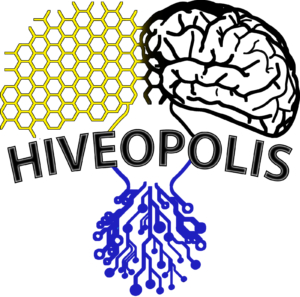Futuristic Beehives for a Smart Metropolis
Our ambition in this research project is to create a modern society of honey bee colonies which is fully adapted to present-day challenges, such as pesticides, parasites, climate change, or urban environments as well as present-day needs, ranging from urban, high-end beekeeping, to professional beekeeping, teaching kids honey bee biology, or professional bee breeding.
In order to achieve these high aiming objectives we will implement a variety of traits into this modern honey bee hive. For example, every honey bee colony will be equipped with an inbuilt dance robot. These dance robots will be able to direct forager bees to certain nectar or pollen sources. Vibrating plates built into combs will prevent colonies from foraging at harmful food sources, such as flowers treated with pesticides or dying colonies which are heavily infested by Varroa mites. A programmed communication system between honey bee colonies will optimise forager allocation at various nectar or pollen sources. Weather forecast data will enable our colonies to prepare for long periods of bad weather, e.g. by selectively directing foragers to pollen sources or by reducing the amount of reared brood in advance. Mapping rewarding nectar or pollen sources according to agricultural databases or foraging locations of other colonies will enable us predict the optimal number of bee hives at the optimal location for beehives. In order to be able to incorporate sensors and robots the entire colony, including the combs, will be made of smart materials. A double door system between each sector of comb and an inbuilt intelligent air-blow system will allow us to exclude bees of particular sectors of comb prior to removing and inspecting them.
Here, we establish, for the first time, a smart honey bee colony system where humans, robots, honey bees, and colonies are able to interact and form a higher level of social cooperation.
Project Leader: Thomas Schmickl
Project Management: Gerald Radspieler, Martina Szopek
Team: Martina Szopek, Asya Ilgün, Martin Stefanec, Daniel Hofstadler, Valerin Stokanic, Stefan Schönwetter-Fuchs-Schistek, Martin Kärcher, Dajana Lazic, Ifeoma Grassl
Duration: 01.04.2019 to 31.03.2024
Granted By: EU H2020 FET
Partners:
École polytechnique fédérale de Lausanne (EPFL)
Université libre de Bruxelles (ULB) BEL
Freie Universität Berlin (FUB) DEU
Pollenity (BST) BGR
Latvia University of Life Sciences & Technologies (LLU) LVA
Humboldt-Universität zu Berlin (UBER)DEU





